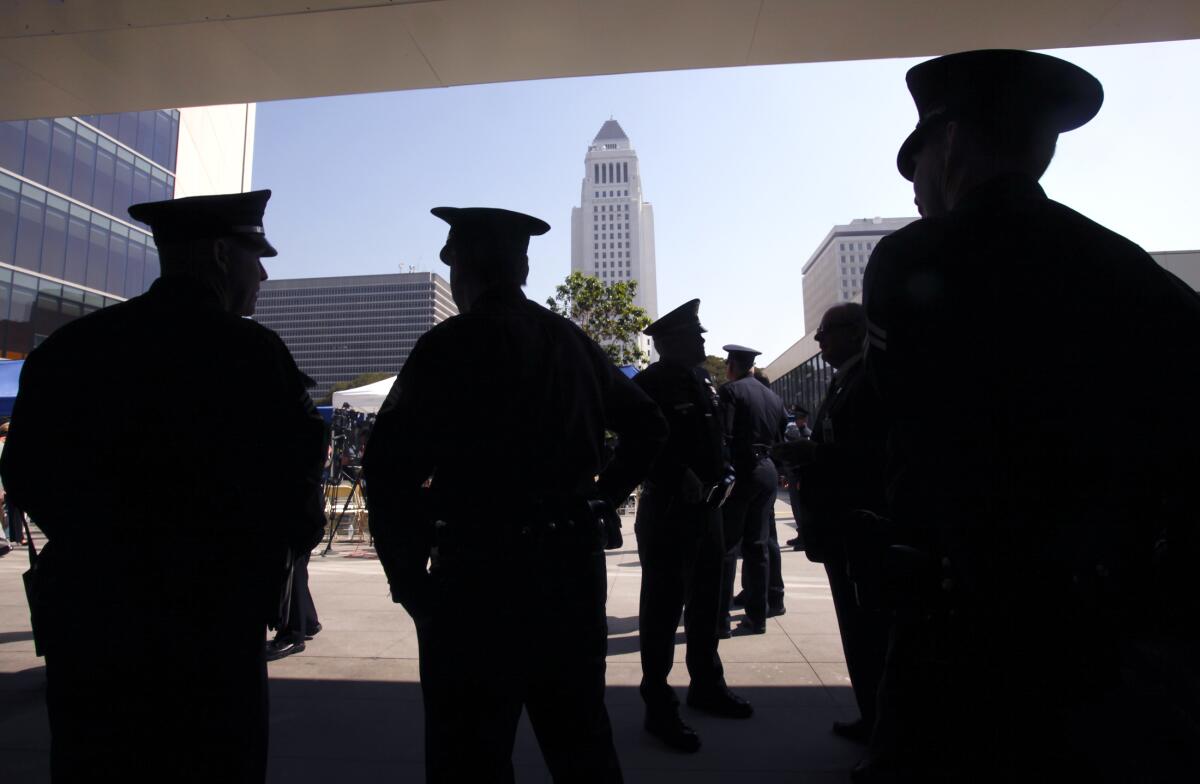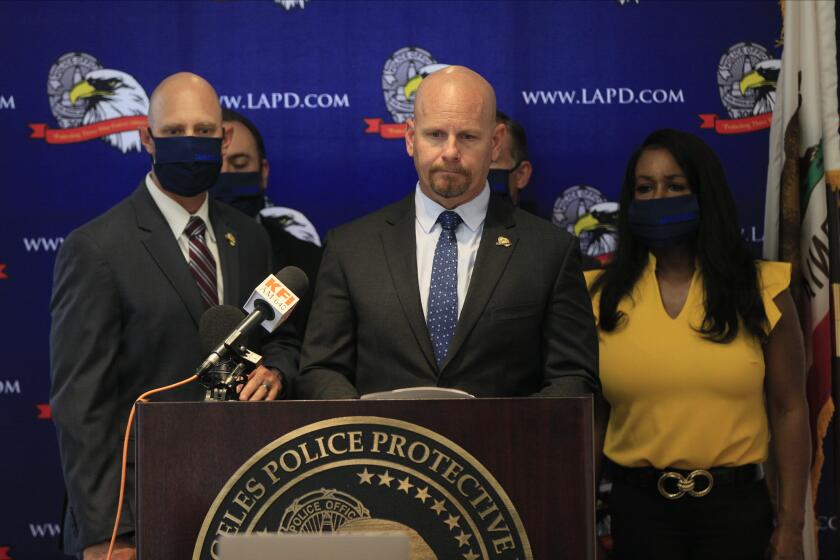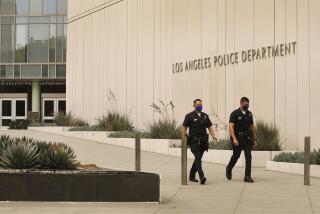Many ‘undercover’ officers in lawsuit over LAPD photos are just regular cops, city says

- The case revolves around the publication of LAPD officer photos on the website “Watch the Watchers” after the city released the images in response to a public records request.
- In recent court filings, city attorneys argued that roughly 900 officers — whose names have so far been kept secret — don’t have a right to remain anonymous in a lawsuit over the photos.
- The officers have claimed that releasing their photos put them in danger because they worked undercover, but city attorneys now say none of those involved are “true full-time ‘undercover officers.’”
After arguing for more than a year that hundreds of undercover LAPD officers were at risk because their photos were mistakenly made public, the city of Los Angeles has suddenly reversed course, conceding that most of those involved are not working in the most sensitive police roles.
In a series of court filings last week, city attorneys argued that the roughly 900 officers — whose names have so far been kept secret — don’t have a right to remain anonymous, and asked a judge to order their identities disclosed if their lawsuit against the city is to proceed. The city has also sought to dismiss the suit entirely.
The case revolves around the publication of the photos on the website “Watch the Watchers” by journalist Ben Camacho and the activist group Stop LAPD Spying Coalition in March 2023. The city’s disclosure of the mugshot-style images — along with names, races and other demographic details of police officers — in response to a public records request sparked outrage in the Los Angeles Police Department, and led to claims by LAPD and city leaders that undercover officers had been endangered.
The alleged assassins behind several recent murder-for-hire cases in Los Angeles were sloppy, authorities say, leaving behind a trail of evidence that links the killings to Chicago gang disputes.
Several officers said in anonymous declarations earlier this year that they were forced to add extra security at their homes and pay for online services to scrub their identities from internet searches. Some said they sold their homes and relocated out of an abundance of caution.
But in filings this week, lawyers for the city told the court that although some officers had worked undercover in the past or might wish to do so in the future, “none of these more than 900 Doe Plaintiffs are presently true full-time ‘undercover officers.’”
Assistant city attorney Hector Emilio Corea said in a sworn affidavit that he was part of a team of lawyers and staffers from the city attorney’s office who painstakingly combed through most of the plaintiff officers’ backgrounds.
Corea said photos of many officers involved had already public on a Facebook page for the LAPD Museum, which published a 2019 yearbook with their names, ranks and assignments.
The yearbook, which remains available for purchase online, is now sold only to current and former law enforcement personnel, but Corea said he used the Internet Archive’s Wayback Machine to show that those restrictions weren’t in place as recently as November 2022.
While acknowledging that some officers may work occasional assignments that require them to go undercover or otherwise mask their identities, only those deemed to be 650s, in LAPD parlance, are considered truly “undercover,” Corea said.
The names of full-fledged undercover officers — who work deep-cover operations with outlaw biker gangs, terrorist groups or drug cartels — are kept out of department records and are known to only a handful of superiors. Most have changed their physical appearance and assumed fictitious identities, all the way down to new driver’s licenses. Some are based outside the state.
While most of the anonymous officers suing the city claimed they were working undercover assignments at the time of the “inadvertent release,” according to Corea, they failed to specify the dates or durations of their assignments.
The latest filings mark a sharp shift in tone from the city, which sued in April 2023 seeking the “return of these inadvertently produced photos to protect the lives and work of these undercover officers.” That lawsuit, since settled, is separate from the suit brought by the 900 officers. The city attorney’s office didn’t respond to an email on Tuesday requesting further comment.
Hamid Khan, an organizer with Stop LAPD Spying, said the city has done an about-face and is now “basically making the same argument that we were making” about the photos not jeopardizing anyone’s safety.
Once a member of the vaunted Robbery-Homicide Division, Det. Kristine Klotz alleges she was demoted after calling out harassment by a male supervisor.
“But not before spending a year demonizing us, demonizing the press and putting this target on us,” Khan said, pointing out that the group received numerous threats after being singled out in public comments by L.A. Mayor Karen Bass and members of the city’s police commission.
When the city sued Camacho and Stop LAPD Spying, trying to claw back the photos, The Times was among the outlets to join a coalition of news organizations that criticized the move as a brazen attack on press freedom. The city agreed in June to settle the lawsuit and pay $300,000 in legal fees, but litigation by the affected officers is ongoing.
When reached on Tuesday, Camacho referred The Times to his thread on X about “the poetic justice” of the city seemingly co-opting the same argument that he and Stop LAPD Spying have been making for months.
Conceived as an accountability and transparency tool for the public, the “Watch the Watchers” site has ironically become so popular among sworn and civilian LAPD employees that some within the department have taken to calling it the “LAPD Facebook.” Many officers who spoke with The Times said that they use the site regularly, sometimes on a daily basis, to look up colleagues in the sprawling 8,700-officer police force.
But in the recent anonymous court declarations, some officers maintained that publishing the photos had put them in harm’s way. One said they had previously worked undercover investigating the Mexican Mafia, and claimed they learned last year about a potential threat against them and them and their wife.
In August 2023, the declaration said, a suspect in the Mexican Mafia case sent a screenshot of the officer’s “Watch the Watchers” photo to a suspected gang associate asking whether they knew who the officer was. The suspect later tracked down the officer’s home address, the officer said. Fearing for their wife’s safety, as well as their own, the officer said they moved to a hotel and had an armed officer stationed outside around the clock.
One officer said they suffered from “extreme anxiety” after their photo appeared on the site, court records show. They said in a declaration that they had worked undercover buying guns from gang members, who were now circulating their photo “with the intent to murder [them] once found.” The officer reported buying extra home security and instructing their spouse to take alternate routes home to avoid being followed.
Jamie McBride, director of the union for most rank-and-file Los Angeles Police Department officers, faces multiple internal investigations related to his company, Watermark Security.
Another officer said they were doxxed by a former high school classmate. The person allegedly blasted the officer’s photo on her Facebook and Instagram accounts, calling them a fascist “pig” and a traitor to their race. The officer said the account’s followers include activists “who hold radical views and frequently [play] a leading role in organizing protests that have turned violent against police officers.”
Matt McNicholas, one of several attorneys representing the affected officers, said that after the city’s previous arguments, it was hypocritical for it to suddenly say his clients should be identified.
“Now they’re taking a completely contrary position? How do you reconcile that?” said McNicholas. “They cannot swear under threat of perjury that there’s irreparable harm, and then turn around say under our litigation, ‘No harm, no foul.’”
He said even officers who go undercover “intermittently” still face danger from having their faces so widely available online.
He accused attorneys for the city of minimizing the threat that such officers face while dealing with suspects who have a propensity for violence and are hypervigilant about the presence of law enforcement.
“Whether you like them or not, whether you want to defund them or not, you cannot put their lives in jeopardy,” McNicholas said.
More to Read
Sign up for Essential California
The most important California stories and recommendations in your inbox every morning.
You may occasionally receive promotional content from the Los Angeles Times.













